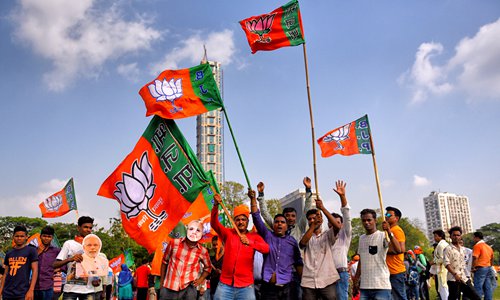By Xie Wenting Source:Global Times

With about 900 million voters eligible to cast a ballot, the Indian elections kick off on Thursday. While the final result will be delivered one month later, both Chinese and Indian experts told the Global Times on Wednesday that Sino-Indian ties will not be influenced, no matter who wins the election.
Opinion polls suggest that Prime Minister Narendra Modi’s Bharatiya Janata Party (BJP) will likely win a thin majority, Reuters reported. But it has become harder for Modi than anticipated months ago, due to the government’s inability to address high unemployment and falling incomes for farmers.
Qian Feng, a researcher at the Chinese Association for South Asian Studies in Beijing, told the Global Times that if Modi wins, China-India relations will likely continue with a positive development momentum, and India’s China policy will see continuity.
On April 27 and 28 last year, Chinese President Xi Jinping met with Modi at an informal summit in Wuhan, Central China’s Hubei Province. Both sides reached a broad consensus on the overarching, long-term and strategic issues of global and bilateral importance, Xinhua reported.
According to Qian, even if Modi fails and the opposition Congress Party wins, it will not harm the current good ties with China. “Keeping good relations with China is for the national benefit of India. Also, it’s beneficial for the India-Pakistan relations.”
India has seen tensions with Pakistan escalate after a suicide bombing killed at least 40 Indian police in Indian-controlled Kashmir on February 14. The Jaish-e-Mohammad (JeM) group, which was banned in Pakistan in 2002, claimed responsibility for the deadly attack. Pakistan is reportedly dominating the election spotlight. Modi’s party is trying to whip up national sentiment on Pakistan.
Now China’s relations with Pakistan as well as India’s trade deficit with China are the two main China-related issues that both the elites and ordinary citizens care about in the election, Dr. Prashant Kumar Singh, an expert on India-China relations, told the Global Times.
In an interview with News 18 on Tuesday, Modi said that India has differences with China, but “our objective is that these differences don’t turn into disputes.”
“And if there are such incidents, then we hold high-level talks. This is a continuous process,” he said.
While India has proposed listing Masood Azhar, leader of the JeM, as a global terrorist, China has put a “technical hold” on the request at the UN as more time is needed for a comprehensive evaluation. Some people in India threatened to boycott China’s goods over this.
Singh said that what Modi has said about India-China relations is a “universally accepted understanding in India about bilateral relations.”
“In India, people are aware that issues of divergence between the countries are complex. But fundamentally, there is no existential problem between them. Therefore, cooperation should not be held to ransom by differences,” he said.
Indian Ambassador to China Vikram Misri told the Global Times last month that his own feeling is that “on foreign policy issues, there is a broad political consensus in India on where our national interests lie. I do not think, therefore, that the outcome of the elections will impact the broad contours of India’s foreign policy in general or the very important relationship with China in particular.”
Qian Feng said that even if some candidates make aggressive and negative comments on China in the election as an attempt to win favor from voters, they won’t really live up to these words when they take office. “As people in charge of a country, what they think is out of the national interest. Therefore, they won’t be diverted by some irrational judgments.”

